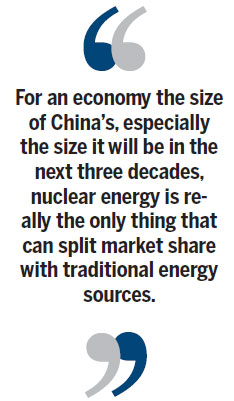Energy for the future
Updated: 2013-10-18 08:54
By He Zhicheng (China Daily Europe)
|
|||||||||||
Government oversight will help nuclear power develop in a safe manner
China's two decades of rapid economic growth and large population have fueled a demand for energy that has outstripped domestic sources of supply, resulting in a relatively low rate of energy self-sufficiency.
Over the years, China has become the world's second-largest consumer of oil after the United States and, since 2008, the third-largest net importer of oil. However, China's per capita resource availability is low by global standards while total energy consumption is slated to become the largest in the world.
Under such circumstances, China has to better manage its dependence on traditional energy resources such as coal and oil. It also has to look for diversified energy sources that conserve energy, have high efficiency, use less space and are reliant on domestic resources.
At present, there are a few energy products that can meet these requirements - shale gas, wind power, solar energy and nuclear power. Although China has huge shale gas reserves, it is only in its initial stage of development due to the complicated geological conditions and uneven distribution. So in the future, shale gas can only be a supplement to traditional energy products given the ever-growing demand for energy.

Wind and solar power, despite high growth potential, have been greatly limited by geographical and natural conditions. For example, wind power is mainly applied on mountaintops or along ocean coastlines, taking up too much land, while solar power depends largely on natural conditions. As a result, for a long time in the future, both of them can only be used to supplement traditional energy products.
However, nuclear power, which doesn't require too much production land, is a better choice for China. It is not only in plentiful supply but easily accessed - the raw materials needed to produce it occur commonly throughout the natural world.
For an economy the size of China's, especially the size it will be in the next three decades, nuclear energy, which is the most effective way to secure energy supplies, is really the only thing that can split market share with traditional energy sources.
The main issues are cost and concerns that come from the poor record of nuclear plants being built to time. China had designed an ambitious plan to develop nuclear energy, but it suspended approval of new nuclear power projects after the 2011 radiation leak at the Fukushima Daiichi plant in Japan, which triggered a nuclear meltdown and public panic.
But we should see that this was simply an adjustment of the development pace. The choice of nuclear power is inevitable for China's energy and electricity power development. So from a strategic viewpoint, China will not give up plans to develop nuclear energy.
As for nuclear explosions and possible leaks in the process of development and production, it is only a matter of time before such problems are solved as energy production and development have always been associated with scientific and technological progress.
Today, the technology used for newly built nuclear power stations in China has reached a peak when it comes to nuclear safety.
With an independent intellectual property right China now has grasped the third-generation nuclear power technology CAP1400, which was based on the technology of Westinghouse Electric's AP1000.
The technology is in accordance with the latest international standards and can meet the latest requirements for nuclear safety after the incident in Fukushima, taking a series of measures to strengthen nuclear safety and fortify against earthquakes, external floods and other extreme natural disasters. The passive safety system has a water replenishment capacity to ensure the safety of nuclear stations.
It is quite possible that refinements of this design could lead to a large and growing domestic manufacturing base that would reduce the need and interest in importing reactor components and designs.
This is very important for a country such as China, because only by achieving its own large advanced nuclear power technology, could it become a strong nuclear power country and implement the "going global" strategy for nuclear power technology and win global orders from other countries such as the US, France and South Korea.
At the same time, we should also accept that nuclear power can never be completely safe, but can be made safer under government control. China should be deeply involved in nuclear energy development, including the siting and construction of the nuclear plants.
The author is chief economist of Agricultural Bank of China.
(China Daily European Weekly 10/18/2013 page8)
Today's Top News
Scientists requested government to plant GM crops
Travelers to Europe bypass attractions of Brussels
Li urges greater effort on reforms
'Constructive ideas' on thorny issues needed
US deal key to nabbing fugitives
JPMorgan, DOJ reaches $13b deal
As China's economy grows, so does reform call
Expanded property tax trials predicted
Hot Topics
Lunar probe , China growth forecasts, Emission rules get tougher, China seen through 'colored lens', International board,
Editor's Picks

|

|

|

|

|

|





